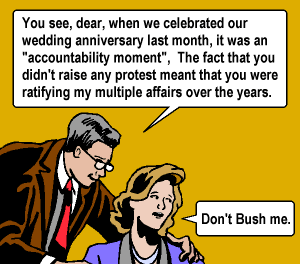We need both anonymity and accountability
January 25, 2006Few days ago Massimo Mantellini brought to my attention this Wired article from cryptography guru Bruce Schneier. It’s a brilliant short essay that explain how bold is the error of those confusing anonymity with accountability and how important is the quest for accountable systems, especially those accessed by anonymous users.

If someone isn’t accountable, then knowing his name doesn’t help. If you have someone who is completely anonymous, yet just as completely accountable, then – heck, just call him Fred. History is filled with bandits and pirates who amass reputations without anyone knowing their real names.
Then I came across this post from Dion Hinchcliffe. Dion has a completely different vision and is ready to give up anonymity for the sake of preserving the writable web!
Of course, there will be attendant problems with this approach including a rapidly vanishing anonymity on the Web. But that just might remain a nice artifact of being a read-only Web user.
I don’t believe anonymity is just a “nice artifact of the read-only web”, it’s an important part of our everyday life. Most of our time we are in an anonymous mode: when we walk the streets of our towns, when we pay cash our newspaper, when we attend the Sunday Mass, when we watch tv at home, ….
But Dion wishes for a different world:
[…] controlling anarchy on the writable Web might be as simple asking that folks flash their Identity 2.0 credential right before they change something on the Internet. This ensures their personal identity is attached to the change. And creating a verifiable chain of evidence might be all it takes for people to act more responsibly. Wiki vandalism, comment flaming, and other forms of anonymous mischief on the writable Web may be eliminated forever when you know that your ID will be attached to it in perpetuity, affecting your hireability, possible suitability for public office, and more, forever.
How scaring! Thankfully the day after I could read Rob Hof post about the same topic and it was a real relief. Suddenly I felt less of an anarchist …
Some people–perfectly good people with insightful opinions–simply don’t want to be identified in some circumstances. Their employers may object. They’re worried about government intrusion. Maybe they’re just shy.
I always thought that Identity 2.0 should give us more freedom, not “creating a verifiable chain of evidence” for anything we do online. I always admire the pragmatic and sensible approach of Dick Hardt to identity, in his answer to Rob he says:
A goal of Identity 2.0 is to mimic aspects of identity transactions that work well in the physical world. We all have different personas depending on context. I present different aspects of myself depending on whether I am interacting with my mother, my friends, my employees, a server at a restaurant, or my banker.
Right, but please remember that for the server at the restaurant you often are just a perfect stranger and hopefully an accountable one!
While showing your identity is easy (exhibit an ID card, logon to a web site), proving your accountability is more difficult and needs more complex infrastructures (technical or social) like the nexus of your professional relationships or the eBay feedback system.
No wonder that there are more people working on identity and much less on accountability. But we need both.
PS - Clipperz, not this blog but the service we will soon reveal, will definitely be an anonymous service. One like you have never seen before. And you can hold us accountable for providing you with real anonymity!
 Mastodon
Mastodon GitHub
GitHub Twitter
Twitter Google
forum
Google
forum